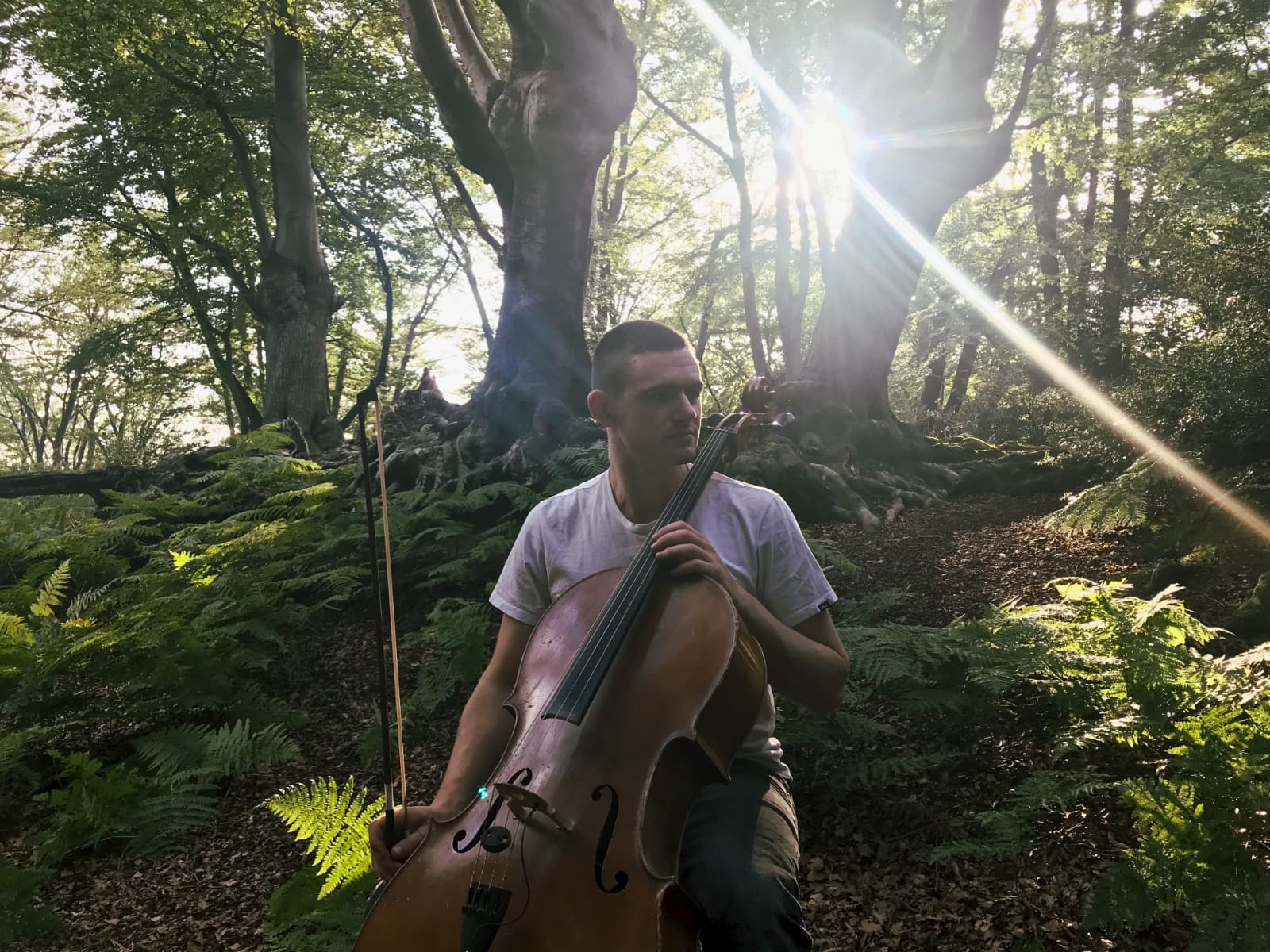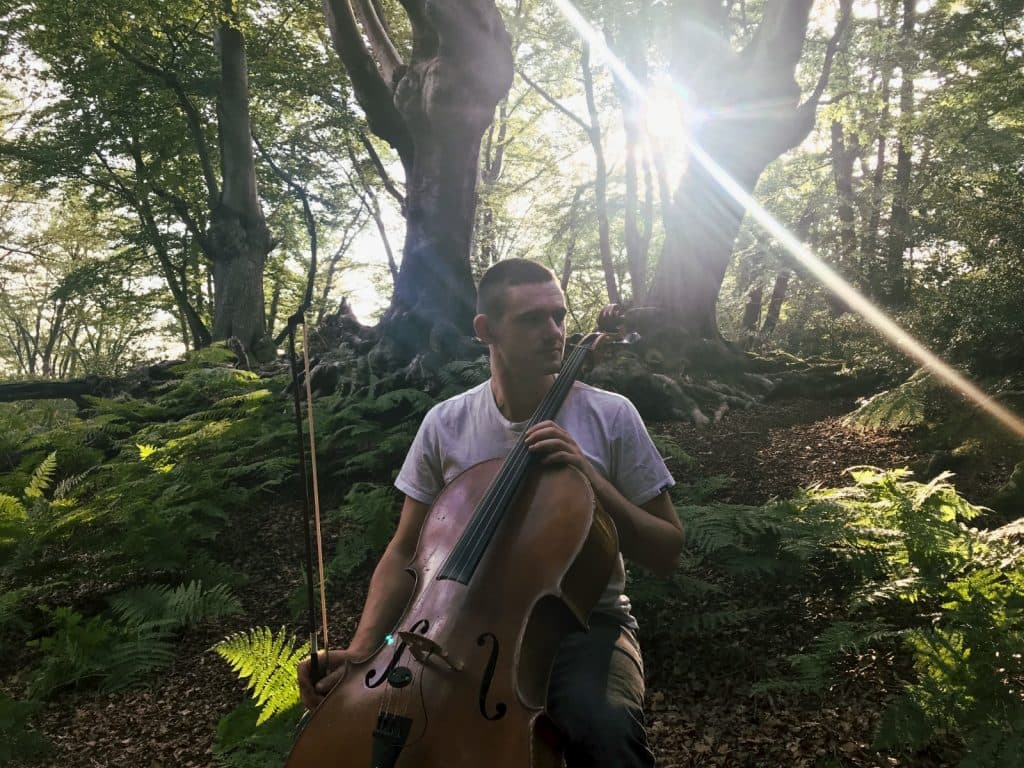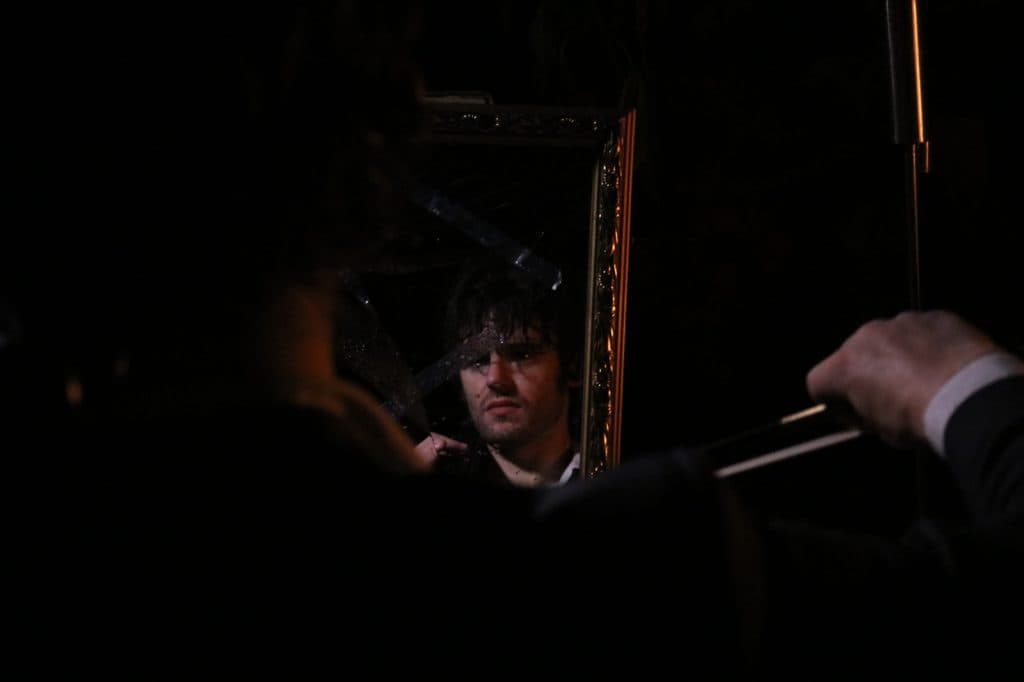
Introducing: Armed With Bow
Having premiered a new mixtape on his show Through the F-Hole, cellist and electronic composer Will Langstone spoke with Sidney Franklyn.

Will in Walthamstow Forest. Photograph taken by Alex Merriam.
++this article is a partial transcript of a phone interview that took place on the 22nd of August. It has been edited for clarity and brevity++
~~~
Sidney Franklyn: How are you doing Will?
Will Langstone: Yeah I’m good. Feeling a little bit wired for some reason. I thought I had a good sleep but yeah, I don’t know. Weird Monday feeling I guess.
SF: Was it the excitement for this interview keeping you up?
WL: Yeah I couldn’t wait, that is exactly it. I must say, I am very excited about this. This is my first interview I suppose. Apart from I did one with George [Powell, Threads’ Head of Production] which was a massive car crash.
SF: What do you mean? Was that at the station?
WL: Yeah, I came and did a live show, and basically whenever I do something and I’m a little bit stressed, technology just picks up on this and kills me. So during that live show- well first, we had a taxi mix-up, so was behind schedule. And then my keyboard melted just as I was setting it up. And these things combined and the adrenaline going through my body meant I couldn’t get any words out! I was like a rabbit in headlights.
SF: It’s always the way. The tech fairies know. Whenever I’m on a big night and I’ve spent thirty quid on a ticket saved on my phone, obviously that’s the night the app crashes.
WL: It just knows doesn’t it.
SF: Big Data’s harvesting our moods, for sure. I think the best place for us to start is the mix, really? And then we can move from there. Because you’ve released two previous singles, is that right?
WL: Yeah, I suppose. Well I mean the second one, um…
SF: “Open Skies”?
WL: “Open Skies”! I didn’t even plan to release that, it was just one of these ambient sessions that I listened back to and thought ‘Oh yeah, I’ll make a picture for that’.
I’ve always seen myself as much more of a ‘live first’ musician, I guess this applies to lots of people. I really wanted to hone my stuff live, particularly the way I play. Recording this stuff you kind of get into it, and if something goes a little bit wrong, it’s really difficult to just fix that. Because how you got there for the last five minutes, ten minutes – and of course it’s all cello – this stuff isn’t just saved and automated so it’s quite… I don’t know… it’s very tricksy.
open skies by Armed With Bow
An interesting problem that I’d forgotten about in recording my stuff, is that because there’s a lot of things changing as it goes along to create the effects that I’m wanting, usually I play just with my pickup. But the sound just isn’t good enough for recording, I think, and so you put a proper mic in the room you get all these extra unwanted sounds and you go ‘Ah! Okay is that just gonna be a part of the mix? How do we get past this?’. I guess that’s a long way of saying: I haven’t really recorded much and I’m not quite sure how to do it. But I’m slowly getting there.
SF: Well, I suppose for somebody who’s more orientated towards live performances, would you say that mixes like these are better representations of your pieces? Because I mean surely an hour mix or a two hour mix is going to reflect your own performances better than putting out a ten minute single on Bandcamp?
WL: Yeah, absolutely. I think this is something that we have to deal with as artists. Obviously we love to perform but the recording bit is essential for being able to perform to people, and to having gigs. Because I really value this long form stuff, how can I make stuff that is marketable? It is really a very different process.
I guess sometimes I make stuff that I’m like ‘Okay, I know I could record this, and I could record this in bits and pieces’. There are a couple of pieces on the mix which very much work as set pieces which I could record in a studio. “Blazing Embers” for instance, another quite self-contained, multi-tracker. But yeah, I do think it’s really important to get this kind of thing across. But how that translates into ears, and actually building an audience… I don’t know. I guess we’re going to find out.
~~~
SF: I was going to check out some more of your shows – you’ve got a show on Threads called Through the F-Hole – but of course the tech fairies knew that I was interviewing you today so Mixcloud has been down for 48 hours. So I wasn’t able to listen to any of your shows! But I was wondering how this new mix sits with those shows, in terms of its content?
WL: I’ve been doing the show for almost a year. The idea when I started doing it was basically I wanted to just be covering live music that’s going on in London, built around the loosely classical scene. That cuts a wide swathe from actual classical music like, I don’t know, the LSO [London Symphony Orchestra] or whatever’s going on in the Barbican or the Southbank Centre, to chamber music, to people doing stuff which is much more contemporary but still from a classical background. Or then also stuff that is what people wouldn’t necessarily consider classical but then feeds into the post-classical scene.
So part of the reason why I wanted to do that, was I guess coming to this music thing I feel like a bit of an outsider. I didn’t go to music school, I didn’t do that journey through uni so it’s been a very DIY journey. I thought the way to do this is to try and work on community building, bringing things together that I’m interested in and letting other people know about it. The show really made me do way more research as to what was going on. It put me in touch with a lot more people. That’s been great.
SF: I was going to ask about that actually, about how valuable has Threads as this community space been to you?
WL: It’s an interesting question. Around January, I started this ambient evensong thing; it kind of came out of nowhere. Threads really helped build on that, I think that was where Threads had a little more experience. It was at the Old Church in Stoke Newington, I don’t know if you know it?
SF: I know it.
WL: So I’d done a couple of shows there, and in January out the blue I got an email from the guy who was running it then (apparently one of my shows had done quite well) asking if I wanted to do any more. And we ended up coming up with this thing where I’d have a monthly night with ambient music and tea. So I bought a load of teapots, I’m now the proud owner of like thirty teapots. Threads were great in putting some feelers out and getting some DJs to add to the lineup.
Now of course, unfortunately I did the first one in Feb as a kind of test run, and was really looking forward to cracking on with that. Then lockdown happened, and the rest is history. So my teapots are stuck in the attic of the church at the moment. Which has now, really sadly closed down!
SF: Completely?
WL: All the people have been made redundant. The church is still owned by St. Mary’s. Billy, the pastor who runs it, was just like ‘We can’t think about opening it yet because it’s just too expensive, all the COVID-secure hygiene costs. I guess in the long term it will open up again, but that was really really sad to hear. It was kind of a ray of hope as well during lockdown, I was like ‘Oh well it’s the church, the church can’t go out of business. It’ll be back before anyone else’. And then that disappeared.
~~~

A still from Armed With Bow’s ritual ending of the work. Taken by Seb Carrington.
WL: I suppose the classical scene isn’t a natural place for Threads. But if they can help grow it, and I’m going to artists and trying to get stuff going – because finding spaces and finding audiences at this time is more challenging – having the backing of Threads gives me that extra bit of confidence and reach in a way. I think it’s a good symbiotic relationship.
SF: When I was first getting involved with Threads Radio, I had a phone call with Lee [Kirk Fagan, Threads Radio Co-Founder] and he was talking about the ethos of Threads being able to have very different genres rubbing shoulders. I remember specifically him mentioning classical and me thinking ‘Woah, I can’t imagine another pop-up radio station in London where classical is on the agenda’. Because the classical circuit is often bordered up and reserved only for perceived ‘higher’ cultural spaces; it’s not really seen as an accessible genre. I remember being very impressed with Lee saying that was one of the directions they wanted to take. I know it’s not like-for-like, but there are quite a few ambient shows on Threads that there is maybe some crossover and some dialogue with your stuff? Because a lot of contemporary classical does verge on ambient, a lot of the minimal stuff.
WL: I think it’s quite interesting… a lot of things you’ve said there really, starting from classical being this separate, cut-off space. This is something I’ve been trying to work out for years really. I mean what is classical music these days? Because we have this idea of what it is, of looking back to the past, of the canon, of the greats. I know that there has been years of an identity crisis.
In my previous work I was working on classical music metadata quite a lot, and ended up seeing quite a bit of how the classical music industry sees itself. There’s all this focus on reaching younger audiences, and the way I guess it’s played out is with the likes of Erased Tapes, these new champions of what classical music means…

Will recording sounds in Walthamstow Marshes.
…What ‘post-classical’ is hadn’t really been resonating with me as a term until a couple of months ago, when I did an episode [of Through the F-Hole] that was focusing on black composers in classical music, as a response to BLM. In doing that, you could see how everything fits together: the trajectory of electronic music starting off as classical music, then slowly moving forward to all these forms of classical trying out all these avant-garde things during the 20th century, before petering out. They can be interesting, but often can be quite academic and not very approachable.
Whereas coming in from the other side we have techno –which has been such a massive influence – people doing electronic music from such a different perspective. People for years have seen this other side and they’re like ‘Well that’s obviously a lot more exciting, I want to be a part of that’. At that point you have an interest in playing with instruments, but you don’t necessarily care that much about the classical canon and it’s just another resource to draw on. I guess that helped me arrive at post-classical because that way you’ve lost all reverence for the past; it’s just something that happened.
Listen to Armed With Bow’s new mixtape as premiered on Through the F-Hole here:
~~~
Armed With Bow is the one man sound organism of cellist Will Langstone, a machine he’s been slowly tuning over several years in response to the question “how do you make electronic music on the cello when you don’t have any free hands?”.
As a cellist, Will took a less common route, opting for a Philosophy degree over music school following half a year busking Italy, which led to a career in music tech, running projects on machine learning and music data.
This interest in complexity and future technology had quite an influence shaping Armed With Bow as a vision of technological enhancement, augmenting the cello with synthesizer, tape delays and other digital add ons in a way that keeps the cellist live and really in control at the centre of everything. It’s constantly growing and the modifications and upgrades are getting more codebased as it matures.
Armed With Bow’s musical output ranges from longform ambient music to a more electronica-infused form of post-classical to whimsical beats. He is also a curator, running Ambient Evensong, a concert series of live ambient music with tea, and hosts Through the F-Hole, a monthly show on Threads radio focusing on a wide range of classical music happening around London.
Author
Sidney Franklyn is a freelance writer, specialising in the influence of contemporary politics on internet music culture. As well as being Threads’ Head of Editorial and a member of the Production Team, Sidney is an Contributor for Ruthless Magazine. If you would like to contribute to the Threads blog, you can contact him via the email address [email protected].
Back to home.